By Maria Gerea
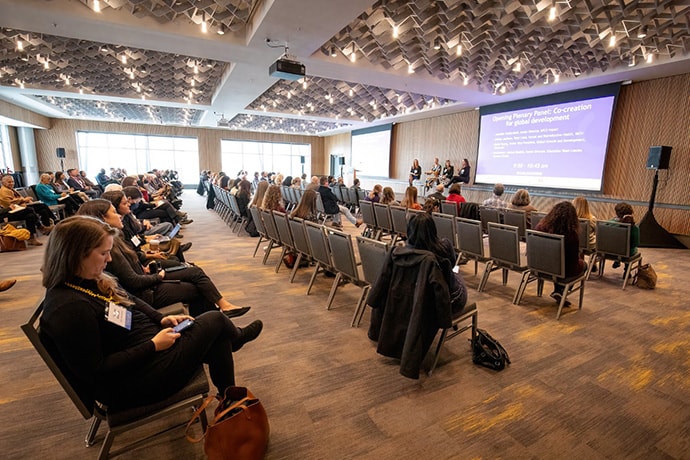
GlobalWA Goalmakers 2022 Conference, Plenary Panel. Photo: John Vicory
It was incredible for me to experience the annual GlobalWA Goalmakers conference in December 2022 and to witness in one day the best of collective intentions for Humanity and the emotional waves of the challenges faced by the practitioners in the field.
On the one hand, I felt at home, as my whole life, I have had a global perspective and have longed to contribute my talents and abilities to the betterment of humanity. In college, I studied international law and was oriented toward a career in international relations. Born under a dictatorship in Romania and witnessing up close both the trauma of authoritarianism also experienced by my family and the systemic change that followed, I committed to championing and partnering with those who take active responsibility for our world. Peace is my highest value.
On the other hand, I felt like an outsider looking in because I do not work in social impact or sustainable development currently. At least not directly. In my work as a Leadership and Team Coach, in the day-to-day, I work with leaders, whether individual contributors or team managers, to help them develop their leadership and the personal capacity to foster better relationships and cultivate healthy team cultures in complex environments. At my best, I enable them to improve on the results and impact they want to create.
With this different lens, I was very encouraged by what I heard at the conference and…I wanted to dive deeper!
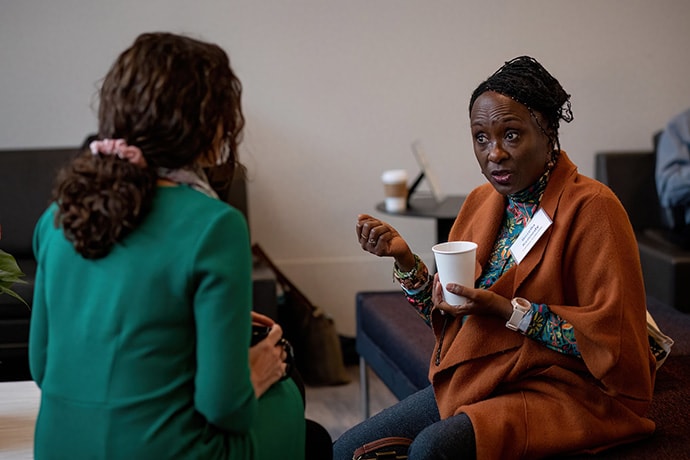
Conference participants. Photo: John Vicory
The theme of co-creation and partnerships peaked my attention, and while many highlighted the importance of co-creating with the beneficiaries of their programs and the behaviors necessary in the act of co-creating (inviting people to the table, better listening, ceding control…), with my well-trained ear, I was seeking to hear something related to the mindset for co-creation.
And then, I heard Ms. Katie Young from Starbucks say…(paraphrasing): we need to co-create with the beneficiaries of the social impact programs, and for that to happen, we need to pay attention to our mindset and ego that can get in the way…
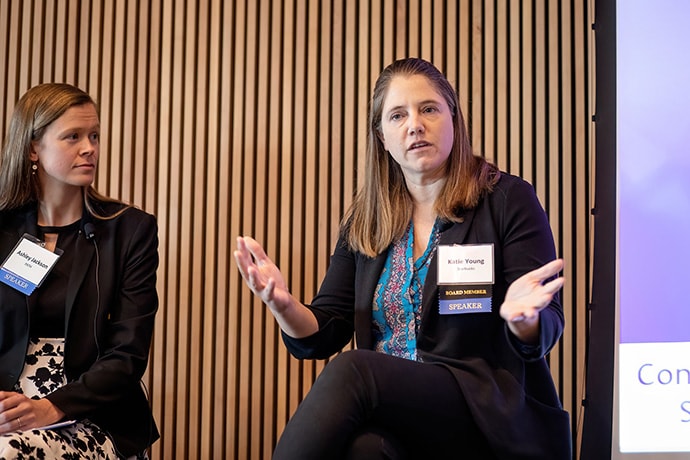
Katie Young and Ashley Jackson talk about co-creation. Photo: John Vicory
Now, this was familiar territory for me, a territory I am passionate about because I believe unless we personally continue to evolve how we think and make sense of reality, we can’t improve our capacity to co-create and foster self-sustaining communities and sustainable development truly.
As the Inner Development Goals initiative highlights, “In 2015, the Sustainable Development Goals gave us a comprehensive plan for a sustainable world by 2030. The 17 goals cover a wide range of issues that involve people with different needs, values, and convictions. There is a vision of what needs to happen, but progress along this vision has so far been disappointing. We lack the inner capacity to deal with our increasingly complex environment and challenges. Fortunately, modern research shows that the inner abilities we now all need can be developed”
In my view, having studied Adult Development theory (summarized here) and worked with leaders in their own development, as well as having done my own inner work, I’ve learned it’s essential for us to focus on personal development to increase our capacity for co-creation because personal development work can take us from the territory of a socialized mind to a self-authored mind and beyond. This adult development progression is non-linear and much time is spent between stages.
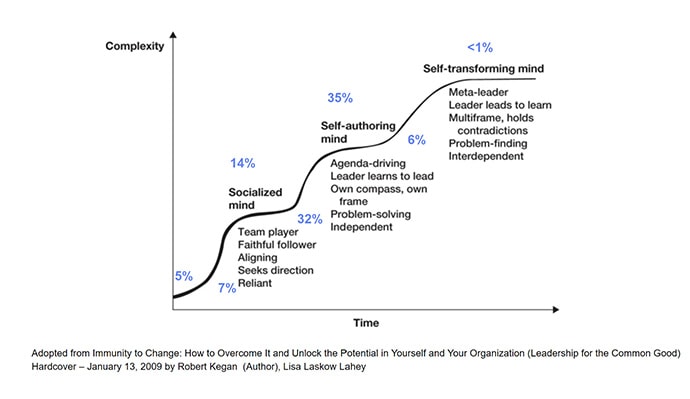
A person with a self-authored mind has developed a sense of self that is no longer overly coupled to relationships with others; they derive their sense of worth (and safety) from their own clearly understood values and a sense of purpose, what I call an inner compass, rather than deriving worth from validation by relationships or societal norms and expectations.
As a consequence, as they develop, a self-authored person becomes less motivated by being right in relationship with others (even when it gets uncomfortable not to know) and more motivated by doing the right thing, sourced from this inner compass they developed over time.
Toward the end of the GlobalWA Goalmakers Conference, I heard Mr. Akhtar Badshah say… to co-create “we have to accept that we can’t predict the outcome, which means we need to be ok with being uncomfortable”. Again, developing a self-authored mind allows us to increase our capacity to be ok with being uncomfortable with the unknown in relationships because we increasingly source our sense of worth from inside ourselves, from our inner compass.
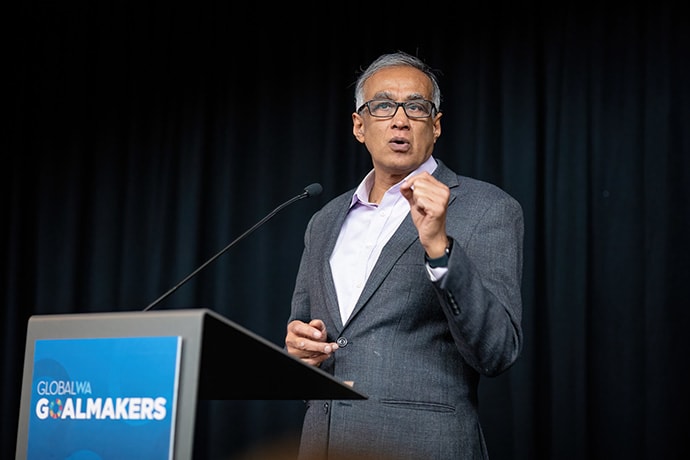
Dr. Akhtar Badshah. Photo: John Vicory
Most importantly, as Jennifer Garvey Berger highlights in her book “Changing on the Job,” a self-authored person is capable of simultaneously holding their opinion and the opinions of others without a risk to their sense of identity or worthiness.
While this capacity to hold multiple opinions increases and the need for being right decreases, the doors open for considering new ideas and perspectives and a willingness to go along, which are fundamental to co-creating.
Thus, in my view, our own personal development is vital to our capacity to co-create so that the best sustainable development solutions emerge.
But what is the aim of co-creation? I love how Otto Scharmer describes it in his book, The Essentials of Theory U: “the aim of co-creating is to build landing strips for the future, through prototypes that allow us to explore the future by doing. The prototypes evolve based on the feedback they generate.”
Specifically for this kind of co-creation, my colleague Nina Simonds and I identified the mindset of “Yes, and” to be successful and have a real impact.
The “Yes, and…” mindset is heavily used in the world of improvisational theater, where partners build a scene by adding on each other’s ideas. This mindset relies on our capacity to
- be present
- hold multiple perspectives simultaneously
- trust others’ innate creativity and intelligence to accept what they offer (their ideas, their emotions)
- be flexible, and
- creatively build on their ideas rather than block them. (Too much blocking kills the scene in improv theater…and damages the relationship and co-creation in multi-stakeholder partnership development.)
Practicing the “Yes, And” mindset helps us cultivate a self-authored mind. As a consequence, we learn to consciously choose to stay in a co-creative relationship with others despite the uncomfortable feeling generated by the unknown, reminding ourselves that our worth (and safety) are not tied to being right or achieving a specific goal and learning to appreciate how the co-creative process leads to more meaningful, sustainable results.
This takes intentional self-understanding, self-awareness, self-compassion, and presence. The good news is that it can be fun, and it can be developed with practice!
Nina Simonds and I want to bring this kind of capacity-building development to mission-driven leaders through our course called Leadership For Real Impact. We hope you will join us!
About the Author:
Maria Gerea is a principal of Coevolution and co-creator of the Leadership for Real Impact course. With 15+ years in global health and tech developing new strategies and leadership expertise as a business leader and then a leadership coach, Maria Gerea has partnered with leaders to cultivate belonging and innovation for thriving teams, extraordinary results, and meaningful impact. Maria is an active community leader in the Seattle area for equity and inclusion in education. As a Leadership Coach, she has an affinity for working with changemakers. Maria holds an MBA from the Foster School of Business at the University of Washington and a Law Degree from “Al.I.Cuza University” in Romania and is a certified coach with the International Coaching Federation (ICF).
Book references:
Changing on the Job: Developing Leaders for a Complex World by Jennifer Garvey Berger, Julie Eickhoff, et al.
The Essentials of Theory U: Core Principles and Applications by C. Otto Scharmer, Wayne Shepherd, et al.